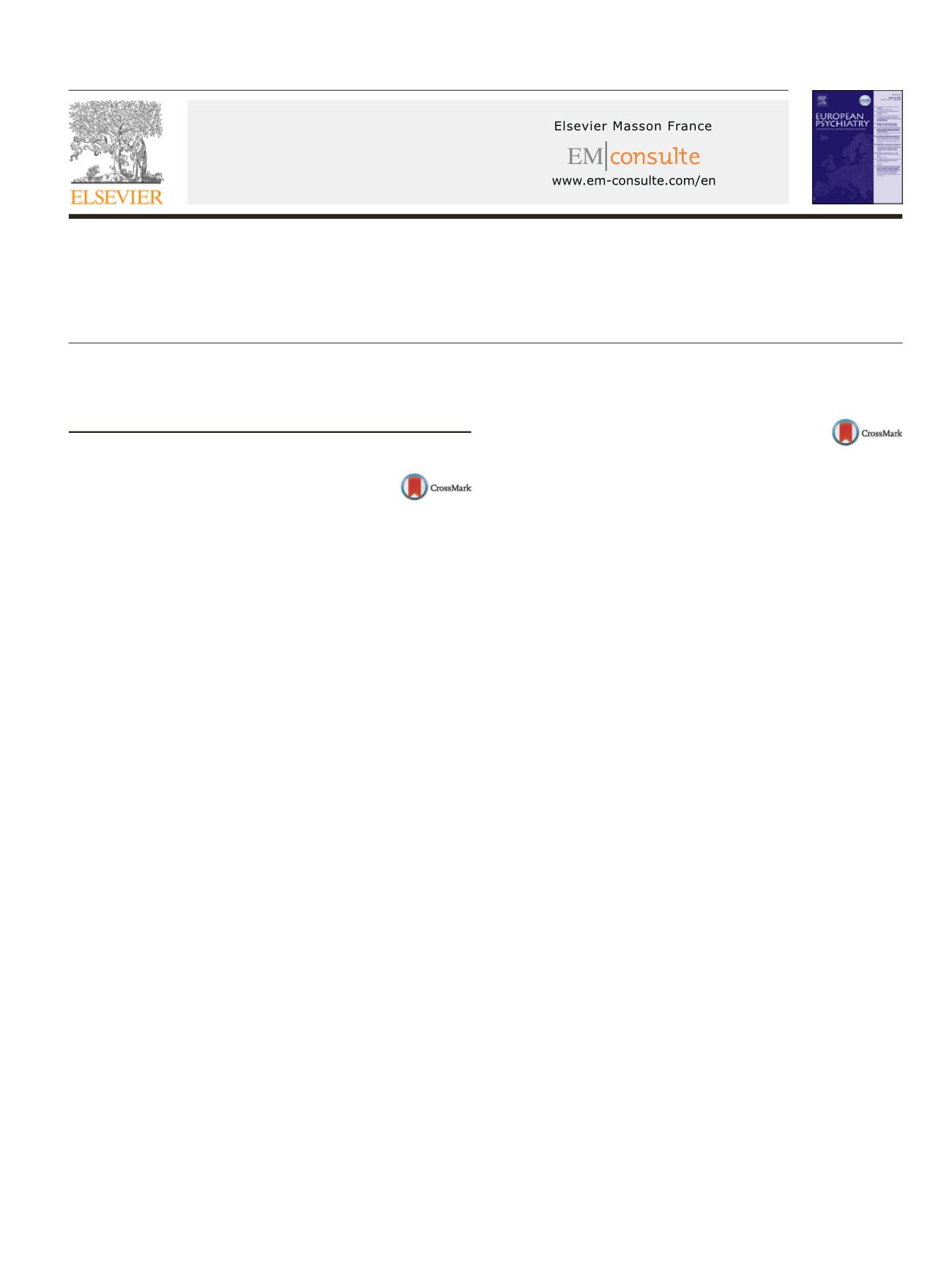
 European Psychiatry 41S (2017) S645–S709
European Psychiatry 41S (2017) S645–S709
Available online at
ScienceDirect
www.sciencedirect.com25th European Congress of Psychiatry
ePoster viewing part 5
e-Poster viewing: Old age psychiatry
EV0739
Relationship of social skills with
perceived social dignity and mental
health of elderly people
H. Allahverdipour
Tabriz University of Medical Sciences, Health Education and
Promotion, Tabriz, Iran
Introduction
Social skills enables one to interact effectively and
avoid the adverse responses. Factors such as non-use of the elderly’s
skills, impaired social skills, indifference and neglect of the elderly
impair social dignity and conversely factors such as living indepen-
dently and respectful relationship will improve social dignity. The
aim of current study was to assess the association between social
skills and perceived social dignity and mental health of elderly
people as well.
Methods
In this cross sectional design, of the 300 elderly partic-
ipants were recruited based on the randomized sampling method
and Reggio social skills questionnaire, Jacelon perceived social dig-
nity and general health questionnaire (GHQ12) were applied to
gauge data by using a written questionnaire in the self report man-
ner. For all tests a significance level of 0.05 was considered and
statistics software SPSS version 21 and AMOS version 13 were
used.
Result
The results showed a significant relationship between
social skills and mental health base on gender and age and also;
there was a significant relationship between social skills and social
dignity (
P
< 0/001). Social skills predicted 26% of social dignity
among older people and also social skills predicted 16% of men-
tal health dignity. Therefore, social skills, was a proper predictor
for mental health and perceived social dignity.
Conclusion
Due to the positive impact of social skills on the
perceived social dignity and mental health of older population, it
is needed to improve social skills of middle aged population which
consequently affect on psychological well-being of aged people.
Disclosure of interest
The author has not supplied his declaration
of competing interest.
http://dx.doi.org/10.1016/j.eurpsy.2017.01.1069EV0740
Residential unit for the elderly:
Cases study and reflections on the first
18months of functioning
A. Amaral
∗
, A.S. Machado , I. Costa
Centro Hospitalar de São João, Psychiatry and Mental Health Clinic,
Porto, Portugal
∗
Corresponding author.
Introduction
The Residential Unit for the Elderly (RUE) was estab-
lished in August 2015 and has capacity for 8 inpatients. It is
intended to behavioral reorganization and caregiver rest of elderly
patients with behavioral changes, particularly in cases of cognitive
impairment.
Aim
We intend to describe the hospitalized population in the
first 18months and discuss the unit functioning and its impact on
clinical stability of patients.
Methods
Socio-demographic and clinical data were analyzed
using the STATA v13.1 software, using multivariate regression
model with a 0.05 significance level.
Results
We present preliminary results from the first twelve
months. Twenty-six patients admitted, 18 (69.2%) were female,
with an average age of 76.7 years-old (IQR 71–86-years-old). The
main reasons for referral were: caregiver rest (38.4%), psychopatho-
logical stabilization (30.7%) and autonomy training/cognitive
stimulation (15.4%). Most patients had dementia (65.4%). Patients
were hospitalized on average 78 days (IQR 30–98 days). Complica-
tions occurred in 18 patients (69.2%). There was an 85.7% reduction
in the number of hospitalizations for any cause within 6months
after hospitalization in the RUE (
P <
0.001) and a 75% reduction in
hospitalizations from psychiatric cause (
P
= 0.001). Regarding visits
to the emergency room (ER), we found a decrease of 87.1% in visits
for psychiatric motive (
P <
0.001) and 85.4% in visits for any cause
(
P <
0.001).
Conclusion
Inpatient care in RUE has contributed to the clinical
stability of patients with consequent reduced use of health services.
Although the results still concern a short operating period, they
appear to be promising.
Disclosure of interest
The authors have not supplied their decla-
ration of competing interest.
http://dx.doi.org/10.1016/j.eurpsy.2017.01.1070 http://dx.doi.org/0924-9338/


















